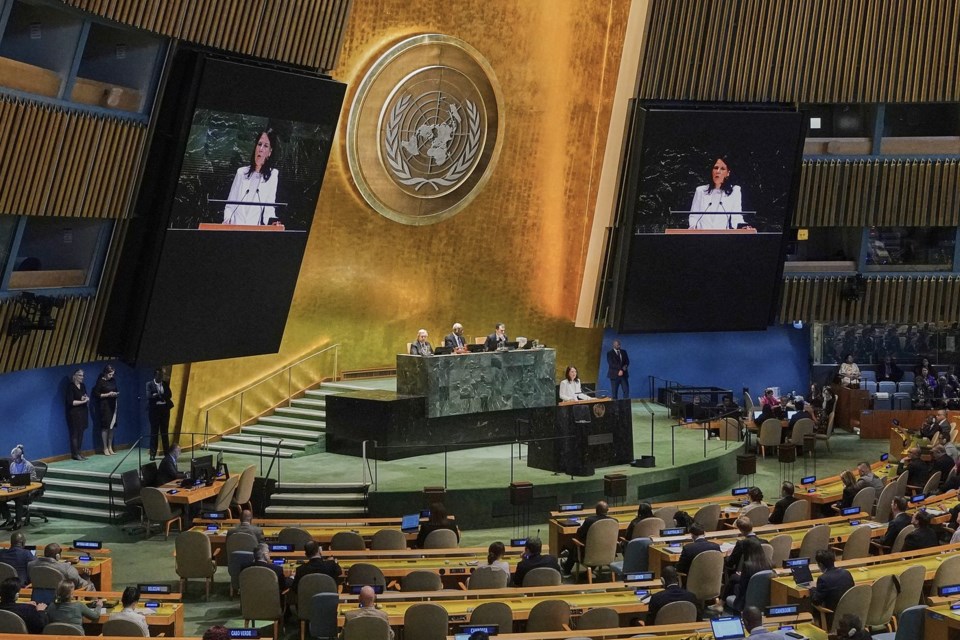UNITED NATIONS (AP) — Five countries won seats on the United Nations Security Council on Tuesday in uncontested elections and will start serving two-year terms in January on the U.N.’s most powerful but deeply divided body.
The 193-member General Assembly held a secret-ballot vote for the five rotating seats on the 15-member council. Bahrain received 186 votes, Congo 183 votes, Liberia 181 votes, Colombia 180 votes and Latvia 178 votes.
This will be the first time on the council for Latvia, which was forcibly incorporated into the Soviet Union and gained independence again after its collapse in 1991.
Latvian Foreign Minister Baiba Braže told reporters after the vote her Baltic nation is ready for the responsibility, saying, “Our historical experience puts us in the position to understand, empathize with, and forge partnerships across every region in the world.”
“We know the value of freedom,” she said. “We know the fragility of peace and the power of multilateralism to safeguard it.”
Braže said Latvia will spare no effort to achieve just and lasting peace in Ukraine and to alleviate suffering in the Middle East, Gaza, Africa and other conflicts around the globe.
Bahrain will be the Arab representative on the council, and Foreign Minister Abdullatif bin Rashid Al Zayani said his country’s election to the council for a second time reinforces its determination to be “a proactive contributor" to international peace and security.
“Our goal is to fortify peace and stability within our region,” Al Zayani said, stressing that resolving the decades-old Palestinian-Israeli conflict is “the cornerstone for achieving peace in the region.”
The immediate requirement, he said, is a ceasefire and massive influx of humanitarian aid into Gaza, the release of all hostages taken from Israel on Oct. 7, 2023, and progress toward a two-state solution and “a viable state of Palestine.”
The Security Council is mandated in the U.N. Charter with ensuring international peace and security, but it has failed in the two major conflicts because of the veto power of Russia on Ukraine and the United States, Israel's closest ally, on Gaza.
There have been decades of efforts to reform the Security Council to reflect the geopolitical realities of the world in 2025, not of the post-World War II era 80 years ago, when the United Nations was established. But they have all failed.
The council still includes five veto-wielding permanent members — the United States, Russia, China, Britain and France — and 10 elected members from the U.N.’s different regional groups. One major failing is the absence of a permanent seat for Africa or Latin America and the Caribbean.
Under its current rules, five new council members are elected every year. In January, the newly elected countries will replace Algeria, Guyana, South Korea, Sierra Leone and Slovenia.
Foreign Minister Thérèse Kayikwamba Wagner of Congo, which will be serving its third term on the council, told the council its election not only reflects confidence in her country, “it is also a reflection of Africa’s unity and its rightful place in shaping the global peace and security agenda.”
Asked about the ongoing fighting by armed groups in the country’s mineral-rich east, she said Congo will bring to the council the knowledge of dealing with decades of conflict, the challenges of U.N. peacekeeping operations and protecting civilians, and “the convergence between conflict, natural resources, and environmental changes.”
Liberia’s Deputy Foreign Minister Deweh Gray, whose country was last on the council in 1961, said her country has “an unwavering resolve to make a difference for all” and to tackle the formidable challenges facing the world including conflict, inequality and climate change, “to name a few.”
“Liberia’s vote is a vote for Africa,” she said, “and we shall ensure that we follow the African common position.”
Colombia’s U.N. Ambassador Leonor Zalabata urged all countries to unite and “keep working together in harmony with nature to preserve what we have and build peace in the world.” And she said, “We invite you all to keep working in the path of human rights.”
___
Edith M. Lederer, The Associated Press



